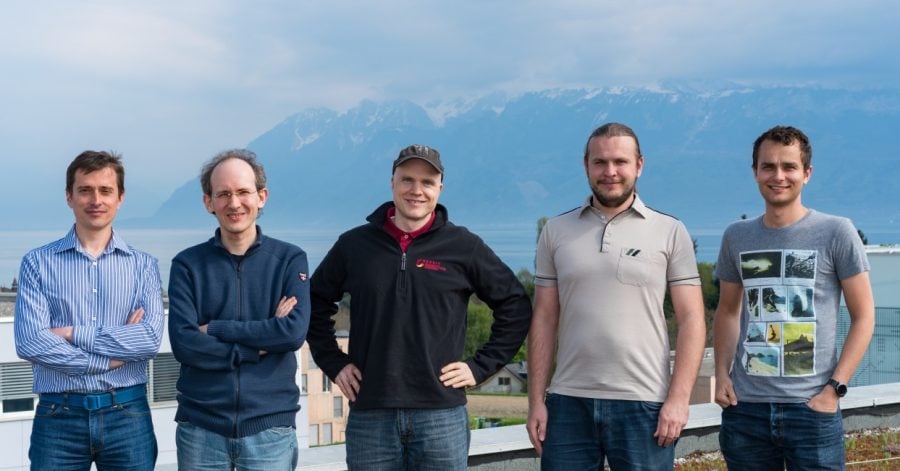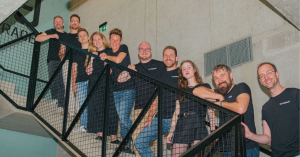Cyberhaven, a startup founded by three Romanians and two Ukrainians has secured a financing of a €90 million Series D funding round led by StepStone Group, along with new investors Schroders and Industry Ventures.
The company is now valued at $1 billion, making it the first company with Romanian/Ukrainian origin to reach a unicorn status in 2025.
Silicon Valley–based Cyberhaven tackles modern cyber threats with AI
Cyberhaven was founded in 2016 by five PhD students: Cristian Zamfir, Volodymyr Kuznetsov, George Candea, Radu Banabic and Vitaly Chipounov, first established in Lausanne, Switzerland, now located in Palo Alto.
Cyberhaven’s data security approach focuses on data lineage, the ability to track how data is generated, moved and transformed within an organization. Instead of just labeling files as “sensitive” based on their content, Cyberhaven looks at their entire journey—making it better at detecting unauthorized access or misuse.
AI plays a central role in Cyberhaven’s approach, particularly in detecting subtle patterns of data misuse. Their next-gen platform is built on a proprietary AI model that operates on a network of data movement, called the Large Lineage Model (LLiM).
How it works in practice? For example, if an employee suddenly downloads an unusually large number of sensitive documents at odd hours, Cyberhaven recognizes this as a potential risk and takes action before data is compromised.
Another major concern today is the use of generative AI tools like ChatGPT and Copilot, which employees increasingly rely on for work. The problem is that people often paste sensitive company data into these AI tools without realizing the risk. Cyberhaven prevents this by recognizing when confidential information is about to be shared with an AI model and blocking the action before it happens.
A year difference: a valuation seven times higher
The Series D round brings Cyberhaven‘s total funding to $250 million and brings the company to a valuation seven times higher than a year ago.
“We are building the data security platform that addresses the most difficult challenges facing enterprise security teams, using a fundamentally new approach,” said Howard Ting, CEO of Cyberhaven, Ziarul Financiar reported.
“In an AI-driven world, data protection must evolve beyond traditional methods and boundaries. We give organizations complete visibility and real-time control over their data, no matter how it transforms or where it moves,” he added.
Cyberhaven is working with or has received support from major tech players including Apple, Google, Intel, IBM, and Microsoft. Their solutions are integrated into the software development toolchains of companies like Apple and Google, and they’ve earned grants and backing from Google, Intel, IBM, and Microsoft.
“We are witnessing a paradigm shift in data security, similar to the emergence of endpoint detection and response (EDR) solutions a decade ago,” said Seyonne Kang, Partner at StepStone Group.
“Just as EDR revolutionized endpoint security by focusing on behavior, not signatures, Cyberhaven’s Data Detection and Response approach redefines data security through AI-powered behavioral analytics. We are excited to collaborate with this extraordinary team as they build the future of data protection in a world where data is always in motion.”
How it all came to be?
Collaboration of five friends began in response to a pivotal event in 2016 when the FBI publicly acknowledged challenges in accessing data from encrypted devices, highlighting the need for advanced data security solutions.
“That year, for the first time, the FBI publicly admitted that it could not crack an iPhone. Of course, iPhone security was ahead of the curve (and of course the FBI did hack it eventually). But for us, that event added up to the mounting evidence that the IT industry was finally getting on track to make hacking into our IT assets so hard — and so expensive — that both casual and professional cyber criminals alike will be forced to look for other ways in,” Volodymyr Kuznetsov said on LinkedIn.
As hackers are constantly exploring other methods of attacks using new technologies, so did the ones preventing them. Leveraging their expertise from institutions like Stanford, MIT, EPFL, and UC Berkeley, the team developed technologies aimed at eliminating critical security vulnerabilities in commonly used systems.
Early support came in the form of a $1 million grant from the Defense Advanced Research Projects Agency (DARPA), enabling the team to transition their research into practical applications focused on preventing data leaks and ensuring intellectual property protection.
By December 2019, Cyberhaven secured a $13 million Series A funding round with contributions from investors including Alex Stamos, Crane Venture Partners, and others. This investment bolsted the development and launch of their Data Detection and Response (DDR) platform, marking a big milestone in their product offerings.
The company’s momentum continued with a $33 million Series B funding round announced in December 2021, led by Redpoint Ventures, with participation from Forgepoint Capital, Wing, and existing investors. This round brought their total funding to $52 million and supported a fivefold growth in annual recurring revenue over the preceding 12 months.
In June 2024, Cyberhaven raised an additional $88 million in a Series C funding round led by Adams Street Partners and Khosla Ventures, with significant participation from existing investors. This influx of capital underscored a breakout year for the company, marked by a 200% growth in new bookings.
Throughout these years, Cyberhaven’s focus remained on advancing their data security solutions, particularly through their DDR platform, which utilizes data lineage and AI technologies to detect and prevent insider threats.
What are founders focused on now?
After first two CEO’s (Kuznetsov and Candea), in 2021 Cyberhaven appointed Howard Ting as the Chief Executive Officer (CEO) to lead the company through its next growth phases.
Over the years, the founders have taken on various roles within the company, here is where they are at now:
-
- Volodymyr Kuznetsov currently serves as the Chief Technology Officer (CTO), leading the company’s technological vision and development.
- Cristian Zamfir holds the position of Vice President of Reliability, focusing on ensuring the dependability and robustness of Cyberhaven’s solutions.
- Radu Banabic is the Vice President of Engineering, overseeing the engineering teams and the development of the company’s products.
- Vitaly Chipounov is
- George Candea has changed many roles in Cyberhaven, from CEO to Chief Scientist, now he is involved only as Board Observer and is fully focused on his role as EPFL (École polytechnique fédérale de Lausanne).








